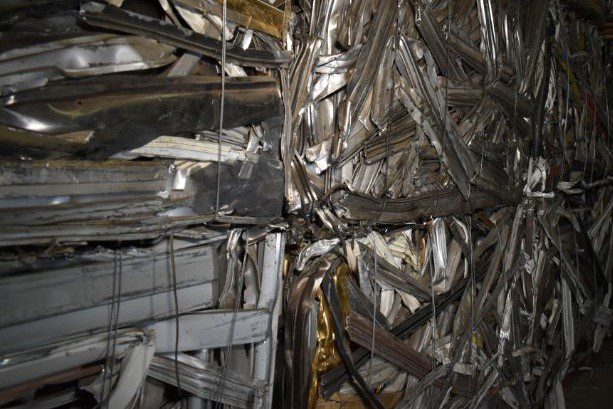When you throw that aluminum can in the recycling bin, a factory somewhere is melting down tons of discarded industrial metal for reuse. You might wonder why this process is so vital.
Well, recycling industrial metal isn’t just about preventing landfills from overflowing. It’s also a crucial step in conserving our natural resources, reducing carbon emissions, and ultimately slowing down climate change.
Did you know that when you recycle one ton of steel, you conserve 2,500 pounds of iron ore, 1,400 pounds of coal, and 120 pounds of limestone? By recycling metal, you save energy and directly reduce the demand for valuable natural resources. Every effort in industrial metal recycling counts, bringing us closer to a sustainable and environmentally friendly future. Remember, we have the power to save our planet in our hands – and in our recycling bins.
But how does recycling contribute to these global benefits? Stick around to find out.
Importance of Industrial Metal Recycling
Industrial metal recycling plays an indispensable role in conserving natural resources and reducing energy consumption, promoting environmental sustainability. When you choose to recycle, especially scrap metal, you contribute to preserving scarce resources. Unlike other materials, metals can be continuously reused without losing quality, making the recycling industry vital for a sustainable economy.
The benefits of recycling go beyond resource conservation. Recycled metal requires less energy than producing new metal from raw materials. This energy efficiency reduces carbon emissions and air pollution, significant factors in global climate change.
The importance of industrial metal recycling is evident in the circular economy. Metals can be recycled indefinitely without damaging their original properties, transforming waste metal into valuable materials. This process not only reduces the need for mining new metals but also decreases the amount of metal waste dumped in landfills.
Recycling industrial metal supports local businesses and boosts the economy. The recycling industry, including scrap metal recycling, creates jobs and promotes economic growth. Therefore, by recycling, you not only save the planet but also contribute positively to your local community.
Benefits of Recycling Scrap Metal
Recycling scrap metal has numerous benefits, from conserving natural resources to boosting the economy. One of the prime benefits is its ability to conserve valuable minerals. By reusing recycled scrap, we significantly reduce the need for mining non-ferrous metals such as aluminum and copper. This saves precious minerals and also requires less energy in the recycling process compared to extracting new metals.
Recycling industrial metal plays a critical role in waste management. Metals can be recycled without losing their inherent properties, which reduces waste generation. This also helps in reducing greenhouse gas emissions that contribute greatly to global warming.
The economic benefits of recycling scrap metal are undeniable. It’s a lucrative sector that fosters job creation, providing significant employment opportunities in waste facilities. On a larger scale, it supports the global trade balance, driving down production costs and boosting the economy through exports.
Scrap Metal: Recycling Processes
When it comes to scrap metal recycling, it’s important to understand that the process is significantly less energy-intensive than producing new metal. This process not only helps conserve limited resources but also reduces environmental harm.
- Segregation: The first step is essential as different metals require different recycling processes. Sorting scrap metal by type ensures effective recycling.
- Preparation: Once segregated, the scrap metal undergoes preparation. It gets cleaned, crushed, and baled to make it more manageable.
- Recycling: The prepared scrap metal is then melted down and formed into new products.
Scrap metal recycling not only offers a less energy-intensive alternative to producing new metal but also contributes to resource conservation and environmental preservation throughout its segregated, prepared, and recycled stages.
Technologies in Metal Recycling
Metal recycling relies on advanced technologies that are constantly evolving to make the process more efficient and environmentally friendly. These technologies play a crucial role in identifying and separating different types of scrap metal, which is essential because each metal requires a unique recycling process. By intelligently segregating metals, the recovery value is maximized while significantly reducing energy consumption.
Recycling facilities now utilize state-of-the-art machinery to handle various metals. For example, steel, one of the most commonly recycled materials, is processed using high-tech equipment to ensure that every bit is recycled and nothing goes to waste.
These technologies prioritize health, safety, and environmental regulations. The controlled burning process, for instance, minimizes harmful emissions. The advanced technologies in metal recycling are pivotal in making the process more efficient, reducing energy consumption, and ensuring that metals can be recycled safely and in an environmentally friendly manner.
Advancements in Industrial Metal Recycling
Technology advancements have greatly improved the efficiency of industrial metal recycling processes.
Advanced sorting techniques have made it possible to separate and recover various types of metals, including ferrous metals, base metals, and even precious metals from mixed scrap. Recycling companies now use sophisticated magnetic and sensor-based sorting systems to segregate metals, ensuring a higher yield of new metals from scrap.
Innovations in smelting and refining have also played a significant role. These advanced techniques and technologies help create high-quality recycled metal products by removing impurities, enhancing metal purity, and reducing energy consumption and emissions during reprocessing.
Automation and robotics have streamlined the recycling process, increasing productivity and safety. Robots are now used for tasks such as dismantling and sorting, even in the recycling of aluminum, which was previously a time-consuming and dangerous job when done manually.
These advancements are revolutionizing the way we recycle industrial metals, making the process more efficient, safer, and more environmentally friendly.
Frequently Asked Questions
Why Is It Important to Recycle Metals?
Recycling metals is important because it combats scarcity, supports sustainable manufacturing and energy conservation, and reduces mining impacts. It also extends the lifespan of materials, lessens waste, safeguards global resources for future generations, and promotes innovative recycling techniques.
By reusing and repurposing these valuable resources, we reduce the need for new mining and extraction. When we recycle metals, we can use them to produce new products without the need for as much energy and raw materials.
Recycling metals promotes innovative recycling techniques. As we continue to develop new methods and technologies for recycling, we can find even more efficient and effective ways to reuse metals. This encourages ongoing research and development in the recycling industry, leading to further advancements and improvements.
Why Is Recycling Metals an Economic Benefit?
Recycling metals is an economic benefit because it saves energy, conserves resources, and creates jobs. It boosts economic growth, stabilizes commodity prices, and offers financial incentives.
Recycling metals offers economic advantages by creating job opportunities. The metal recycling industry requires workers for collecting, sorting, and processing recyclable materials. These jobs contribute to local economies and provide employment opportunities for individuals. As a result, recycling metals not only benefits the environment but also supports economic development.
Recycling metals helps to stabilize commodity pricing. By recycling metals, the demand for virgin materials decreases, which can help to prevent price fluctuations in the market. This stability is advantageous for industries that rely on metals, as it allows them to plan and budget more effectively.
Recycling metals provides financial incentives for individuals and businesses. Many recycling programs offer monetary rewards or tax credits for recycling metals. These incentives encourage more people to participate in metal recycling, leading to increased recycling rates and further economic benefits.
How Does Recycling Metals Affect the Environment?
Recycling metals has a positive impact on the environment. When you recycle metals, you reduce metal toxicity, minimize pollution, and lessen the impact on landfills. Recycling also helps to curb the consequences of mining, conserves energy, and reduces your carbon footprint. It also protects biodiversity and prevents soil degradation and water pollution. Additionally, recycling metals helps to safeguard the ozone layer.
Why Is Recycling of Metal More Cost Effective?
Recycling metal is more cost-effective because it reduces labor costs, energy consumption, and mining. When metal is recycled, it requires less labor compared to mining and extracting new metal from the earth. This means that fewer workers are needed, resulting in lower labor costs.
The energy consumption involved in recycling metal is significantly lower than the energy required for mining and processing new metal. This is because recycling metal involves melting down the existing metal and reshaping it, whereas mining and processing new metal requires extensive energy-intensive processes.
Take Action for a Sustainable Future
Understanding the significance of scrap metal recycling in reducing energy consumption and environmental impact underscores the importance of participating in sustainable practices. As you consider the benefits of recycling metal, remember that Greenway Metal Recycling offers comprehensive industrial scrap metal recycling services. Take action today by choosing to recycle your scrap metal with Greenway, contributing to a greener and more sustainable future for generations to come.

